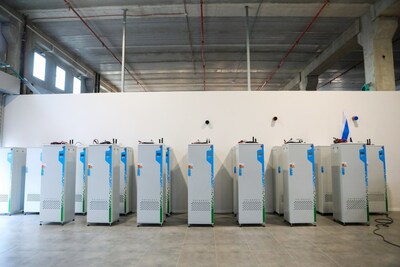
When the electricity supply on the Israeli side of the Gaza border region was knocked out on that fateful Saturday morning, Phinergy's backup energy system installed at local telecom sites kicked into action, powering cellular communications for tens of hours.
Founder Aviv Tzidon: "Our system enabled subscribers of our cellular provider client to maintain continuous communications, under the most difficult circumstances."
TEL AVIV, Israel, Nov. 7, 2023 /PRNewswire/ -- The murderous terror attack on the south of Israel on October 7 led to major disruptions in cellular communications in the Gaza border region, as the electricity grid collapsed in many places where fighting had broken out. With backup systems designed to provide only a few hours of service, most cellular communications sites in the area suffered a temporary electricity outage, leaving mobile phone users in the region unable to communicate in the critical hours at the start of the war.

However, the cellular sites at which Phinergy (TASE: PNRG) systems were installed were able to continue providing essential connectivity for tens of hours. Throughout the initial days of fighting, Phinergy's green energy systems, based on innovative aluminum-air technology, made a huge contribution to efforts to maintain the operation of communications around Israel's Gaza border region.
Phinergy's chairman and founder, Aviv Tzidon: "Our systems have already proven their effectiveness and resilience in day-to-day life, successfully backing up cellular infrastructures as needed from time to time. Now, the systems have also been proven to successfully provide tens of hours of continuous connectivity in emergency situations, enabling cell-phone service subscribers to stay in ongoing contact with their families and with rescue forces, even in the most difficult situations."
Founded in 2009 by Tzidon, a serial entrepreneur, and managed by CEO David Mayer, Phinergy has developed technology to produce metal-air batteries that release electric energy from aluminum and zinc. The company's aluminum-air systems are intended to provide backup energy for critical infrastructure, such as telecom sites, hospitals, data centers, etc. as a standby for electricity grids. Phinergy is also focused on electricity production applications for electric vehicles.
Close client cooperation
The customer, a major Israeli mobile operator, has installed Phinergy's backup systems at several hundred sites representing more than 10% of its network. When the war broke out, the Phinergy backup systems were operating at some of this client's sites near the Gaza Strip, most cellular communications in that area experienced severe disruption, due to the lack of a continuous electricity supply. Tzidon says that this situation put to the test the efficiency and flexibility of the system developed by the company, albeit in tragic circumstances.
Smart remote management
Another factor that enabled Phinergy to function so well in this critical situation was its ability to remotely control electricity consumption at the communications sites. From the day fighting broke out, remote, smart management of the Phinergy systems made it possible to regulate the rate of electricity flow, so that it would last for much longer.
"In practice, our system stores a lot of energy at the (cellular) site itself, due to the aluminum components," says Tzidon. "By switching the system to savings mode, we were able to successfully reduce the load, and extend the electricity supply by several tens of hours during the attack. This remote management capability is something that all Phinergy's employees are very proud of."
Photo - https://mma.prnewswire.com/media/2267537/Phinergy.jpg
For further information about Phinergy, please visit phinergy.com or contact Mr. Dor Ganor: media@phinergy.com.
![]() View original content:https://www.prnewswire.co.uk/news-releases/phinergy-prevented-the-collapse-of-cellular-networks-on-october-7-301979715.html
View original content:https://www.prnewswire.co.uk/news-releases/phinergy-prevented-the-collapse-of-cellular-networks-on-october-7-301979715.html


